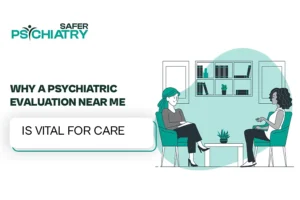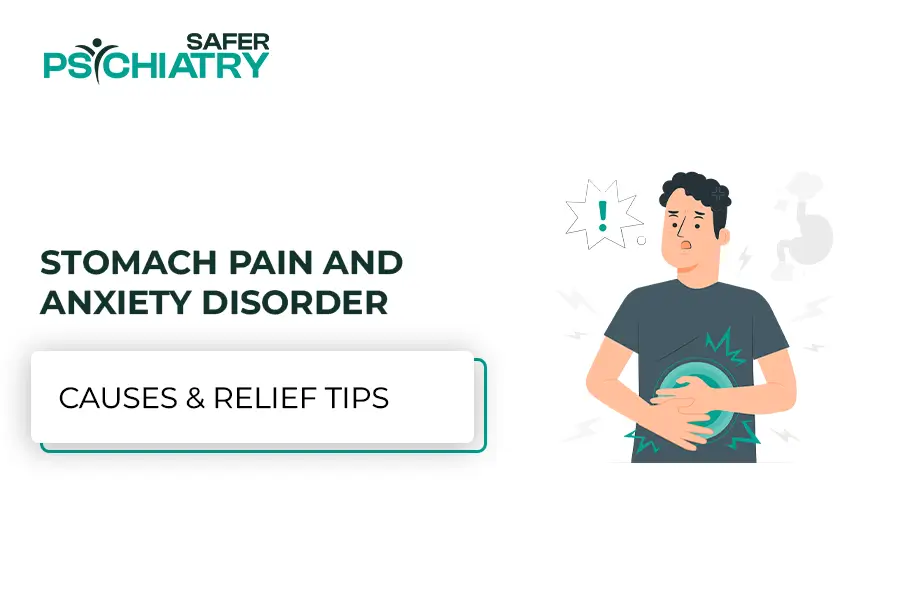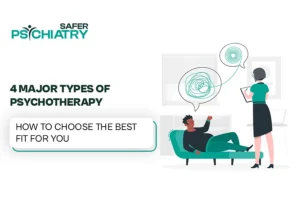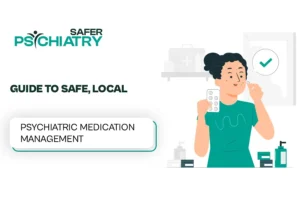
Stomach Pain and Anxiety Disorder
Causes & Relief Tips
At Safer Psychiatry, we provide compassionate, evidence – based mental health care to support your well-being now and for the future – because your journey matters, and so do you.

- Stomach pain and anxiety disorder are closely connected through the gut-brain axis.
- Stress and anxiety can cause symptoms like cramping, nausea, indigestion, or bloating.
- Pain often appears during stressful moments and improves with relaxation.
- Lifestyle changes, therapy, and psychiatric care can significantly reduce symptoms.
- Seek medical attention if stomach pain is severe, persistent, or includes red-flag symptoms like vomiting blood or unexplained weight loss.
If you’ve ever noticed your stomach hurts when anxious, you’re not imagining things. Anxiety and digestive issues are closely linked through what doctors call the gut-brain connection, and many patients benefit from psychiatric care for anxiety disorders to manage both mental and physical symptoms. When your mind is under stress, your digestive system often reacts with discomfort, cramping, or even severe pain.
For patients struggle with stomach pain and anxiety disorder, this overlap can be frustrating and sometimes frightening. With the right care, both your mental health and your stomach symptoms can improve.
How Anxiety Causes Stomach Pain
Anxiety activates the body’s fight-or-flight response, releasing stress hormones like cortisol and adrenaline. While this reaction helps you face immediate danger, it also disrupts normal digestion. As a result, you may experience:
- Stomach cramping or muscle tightness
- Nausea and queasiness
- Indigestion or acid reflux
- Urgent trips to the bathroom
- Bloating or fullness without eating much
What Anxiety-Related Stomach Pain Feels Like
The sensations can vary widely. Some describe it as a dull ache, while others report sharp cramps or burning. Common stomach pain anxiety symptoms include:
- Cramps or abdominal pressure before stressful events
- Heartburn and indigestion during anxious moments
- Nausea or diarrhea during panic episodes
- Bloating or gas that comes and goes with stress
- Severe stomach pain and anxiety during heightened worry
Unlike pain from infections or digestive diseases, anxiety-related stomach pain often improves once stress levels go down.
Is Stomach Pain a Symptom of Anxiety?
Yes, in many cases. Signs your abdominal discomfort may be linked to anxiety include:
- Pain that appears during or shortly after stressful situations
- GI tests show no medical explanation for symptoms
- Episodes are paired with anxiety symptoms like restlessness, sweating, or racing heart
- Pain improves when stress is managed
Still, not all abdominal pain is psychological. Conditions like IBS, ulcers, or gallbladder issues can also cause symptoms. That’s why it’s important to consult both a medical doctor and a psychiatrist when symptoms persist.
Why Anxiety and Depression Can Worsen Stomach Pain
Many patients experience depression and anxiety together, which can worsen stomach discomfort. Depression may slow digestion, while anxiety speeds it up creating a cycle of discomfort. This is why stomach pain anxiety depression is a common combination seen in psychiatry clinics.
How to Ease Stomach Pain from Anxiety
If you’re struggling with anxiety disorder and stomach issues, treatment usually works best when it addresses both the psychological and physical sides of the problem. Options may include:
1. Mind-Body Strategies
- Deep breathing techniques like box breathing calm the nervous system.
- Mind fullness meditation helps shift focus away from pain and worry.
- Gentle exercise such as yoga or walking reduces tension and aids digestion.
2. Healthy Lifestyle Habits
- Eat balanced meals and limit caffeine or processed foods.
- Stick to a consistent sleep schedule.
- Stay hydrated and adds gut-friendly foods like yogurt or ginger tea.
3. Professional Psychiatric Treatment
- Seeking psychiatric care for anxiety disorders can often ease both emotional distress and stomach pain.
- Treatment may include Cognitive Behavioral Therapy (CBT) to break the cycle of worry and physical symptoms.
- In some cases, medication management for anxiety may be recommended to reduce both mental and digestive symptoms.
- Regular checkups ensure no under medical condition is being overlooked.
Final Thoughts
In our clinic, we’ve seen firsthand how overwhelming stomach pain anxiety symptoms can be. Many patients feel discouraged when medical tests show no clear cause, yet their pain continues. The reality is that the mind and body are deeply connected.
If you’re struggling with ongoing stomach pain and anxiety, don’t wait, schedule an appointment with our clinic today to start feeling better.
Disclaimer: This article on stomach pain and anxiety disorder is intended for educational and informational purposes only. It is not a substitute for professional medical advice, diagnosis, or treatment if your symptoms persist, it’s important to know when to seek help and consult a psychiatrist.
FAQ
Frequently Asked Questions
Can anxiety really cause stomach pain?
Yes. Anxiety activates the body’s stress response, which can affect digestion and lead to cramping, nausea, or abdominal discomfort. This is often called the gut-brain connection.
How do I know if my stomach pain is from anxiety or another condition?
If your pain appears during stressful situations and improves when you’re calm, it may be linked to anxiety. However, severe or persistent pain should always be evaluated by a doctor to rule out conditions like ulcers, IBS, or infections.
What are mutual symptoms of anxiety-related stomach pain?
Patients may experience bloating, cramping, nausea, diarrhea, heartburn, or a sensation of “knots” in the stomach during anxious episodes.
How can I decrease stomach pain caused by anxiety?
Techniques like deep breathing, mindfulness meditation, light exercise, and healthy eating often help. For lasting relief, psychiatric care such as therapy or medication management may be recommended.
Should I see a psychiatrist for stomach pain linked to anxiety?
Yes. If your abdominal discomfort is linked to anxiety disorder and stomach issues, a psychiatrist can help by addressing the underlying anxiety while also guiding you on lifestyle changes and treatment options.
When should I seek urgent medical care for stomach pain?
Seek immediate help if your pain is severe, persistent, or includes symptoms such as vomiting blood, black or bloody stools, unexplained weight loss, or high fever.
Our Company
Copyright © 2024 Safer Psychiatric Consulting Services


